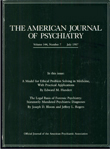Psychiatry and Religion: Context, Consensus, and Controversies
When the editor of the Journal wrote that psychiatry “literally means `physician/healer of the soul/mind.'.We must both cherish this grandness and preserve it from the perils of grandiosity” (1), she signaled the coming sea change in the relationship between psychiatry and religion. Psychiatry and Religion lends breadth of vision and depth of understanding to this transition. By laying out the initial points of consensus between religion and psychiatry, the assembled authors highlight the progress already made in the conversation. Most of the chapters are strongly written. The essays fall into three parts: Introduction and History, Religions: East and West, and Psychopathology, Psychiatry, and Religion. This is the first psychiatric volume I have read in 15 years of professional practice where the authors demonstrate a familiarity and sympathy with the seminal theorists of the 50-year-old clinical pastoral counseling movement.
This collection of essays is designed to address “the interface between mental health and religion,” which the editor declares is a neglected area. Mr. Bhugra succeeds in achieving this goal. His point that “cooperation between doctor and clergyman is essential in ministering to the total needs of the person” is made again by several contributing authors.
This message is reinforced by compelling theoretical essays and sensitive clinical vignettes. Some of the stronger essays are “Religion and Psychiatry: Extending the Limits of Tolerance,” “Christianity and Psychiatry,” “Guilt, Religion and Ritual,” and “Mental Illness or Life Crisis? A Christian Pastoral Counseling Contribution.” The essay by Dr. John L. Cox, “Psychiatry and Religion: A General Psychiatrist's Perspective,” is the strongest chapter of the volume and would benefit both clergy and medical practitioners.
Chapters on Hinduism, Buddhism, Islam, and new religious movements will be helpful introductions for readers who are unfamiliar with these religions. These chapters illustrate the diversity of current religious sentiment in those who come for psychiatric care and reinforce the volume's primary message: humane care is rooted in the nature of the Divine and is a shared concern of medicine and religion.
The writers move easily between theological concepts such as guilt, sin, and ritual and psychological constructs such as object relations theory, the neurophysiology of religious experience, and the psychosocial factors that influence religious development. This movement is done without syncretism or triumphalism. Each discipline's strengths are portrayed with sensitivity but not zealotry. If there is an “evangelical” cast to the book, it appears to be this: good things, even healing, happen to the patient when the practitioners of religion and psychiatry team up to provide competent care.
This book does have three weak points. The figures, although not plentiful, do not seem to illuminate their essays. One essay's personal notations are loquacious and therefore tiring to read. The price may be prohibitive for an individual but would be worthwhile for a library purchase. The lists of references are respectable, and the index is helpful.
1. Andreasen NC: Body and soul (editorial). Am J Psychiatry 1996; 153:589–590Link, Google Scholar



